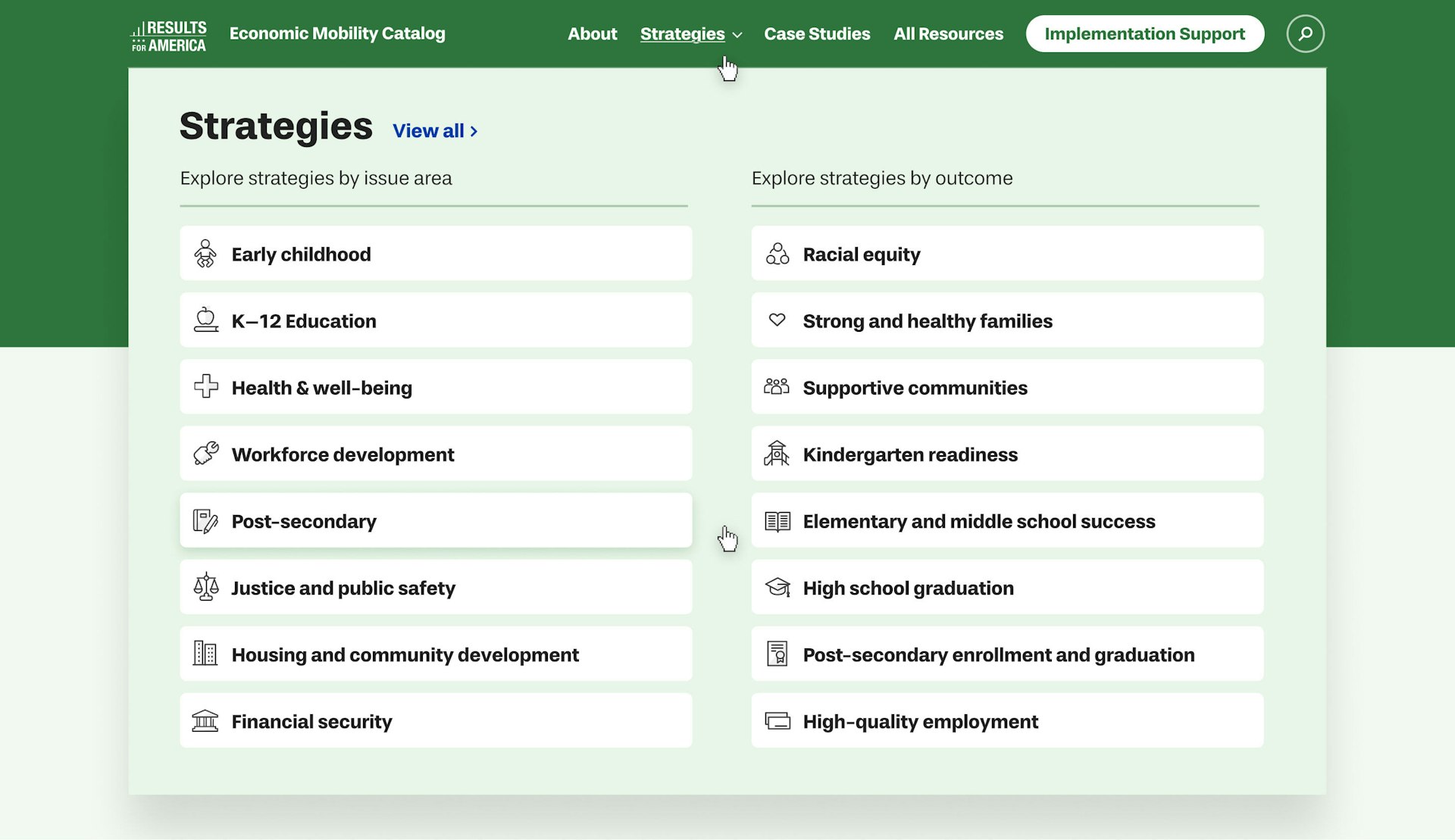

A policy platform for economic mobility
Though the federal and state policy debate tends to dominate national discourse, local governments can in fact have tremendous influence over the lives of their residents. The problem many local leaders face, however, is not knowing what, of the many possible social programs, will have the most impact on their constituents.
- Services
-
Design, Development, Strategy, Analytics, and UX
- Industry
-
Social Impact
Though the federal and state policy debate tends to dominate national discourse, local governments can in fact have tremendous influence over the lives of their residents. The problem many local leaders face, however, is not knowing what, of the many possible social programs, will have the most impact on their constituents.
Driven to fix the economic mobility crisis, Results for America (RFA) connects city leaders to evidence-based programs and strategies they can leverage to create lasting change within their communities. Courtesy of the Economic Mobility Catalog (ECM), RFA can now publish and share those strategies online, significantly expanding the reach of their mission.
A collaborative effort between Happy Cog and RFA, the Economic Mobility Catalog houses 200 evidence-based interventions that have proven to accelerate change on a local level. Working closely with policy experts and prospective users, we helped RFA organize, structure, and connect a vast library of content stretching across education, youth development, justice, housing, and financial security.
Interestingly, the content and interface actually evolved as one, as reading habits we observed during testing influenced the substance and presentation of the content.
Through in-depth external stakeholder interviews, we learned many of the people who’d be using the site prefer to search policy information in terms of “I have an issue…” or, “I’m looking for xyz outcome.” We created a dual navigation that allows the visitor to browse case studies based on criteria relevant to their circumstances. For example, how a similarly sized city with a similar constituency solved a similar problem.
Policy is a team effort that’s built together over time. Our design process was no different — it was iterative and co-creative with the RFA team. We tested our content and design with policymakers in municipal government to make incremental and useful improvements.

On the development side, we created a Craft CMS powered back-end that allows the client to manage all of these unique pieces of data. The client was interested in a very structured approach, so we leveraged Craft CMS to define all the areas of the content and implemented an author experience that aligned with the content strategy and client expectations. By working closely with the client we were able to find that fine line of “structured yet flexible” when it came to the CMS setup. As this was a nonprofit, we also set them up with a non-profit Algolia plan to power the instant search of all their issues and outcomes.
On the development side, we created a Craft CMS powered back-end that allows the client to manage all of these unique pieces of data. The client was interested in a very structured approach, so we leveraged Craft CMS to define all the areas of the content and implemented an author experience that aligned with the content strategy and client expectations. By working closely with the client we were able to find that fine line of “structured yet flexible” when it came to the CMS setup. As this was a nonprofit, we also set them up with a non-profit Algolia plan to power the instant search of all their issues and outcomes.
Happy Cog was a terrific partner to us at Results for America. They brought a skilled, multi-faceted team to the creation of the Economic Mobility Catalog and were easy to work with throughout the process. We are so pleased with the end result.
That iterative design and testing was critical to the product’s ultimate success. By involving client experts and potential users from concept through completion, the product immediately found its target audience. We also effectively created a product that allows the client to showcase their data in an organized and structured manner that aligns with their audience. We made managing this data in a content management system easy, and presented this data in a visually appealing way.
To quote one chief of staff to an influential congressman: “the best presentation of this kind of information I have ever seen.” A true labor of love, we look forward to the ECM’s continued growth and iteration.








